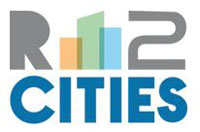| Nov 05, 2013 | |
Building towards 'nearly zero energy' cities |
|
| (Nanowerk News) An ambitious four-year project is to develop and demonstrate replicable strategies for designing, constructing and managing large scale district renovation projects for achieving nearly zero energy cities. The results will open the way for new refurbishments that bring the EU closer to its 2020 goal of ensuring that all new buildings consume very little energy. | |
 Buildings across Europe currently represent about 40% of the energy consumption and about 36% of the EU's total CO2 emissions. Though the 'zero energy' concept is billed as a means to reduce carbon emissions and reduce dependence on fossil fuels, it remains relatively uncommon in developed countries but is fast becoming a possibility through the progress made in new energy and construction technologies. Sixteen research institutes with the support of EU funds are involved in the R2CITIES project, which hopes to develop cost-effective, high performance retrofitting solutions to improve the quality of city renovation and increase the energy efficiency of buildings. As Project coordinator Rubén García summarises, 'the most important goal of R2CITIES is to be a mirror for future cities, with our innovative solutions cascading through to stakeholders across different urban areas'. García led discussions at the project's kick-off meeting in July, in which the team outlined plans to renovate three districts. The three demonstration sites - Genoa, Italy, Kartal, Turkey and Valladolid, Spain - were chosen due to the unique set of challenges presented in each region. |
|
| The Genoa site is a council housing estate in the periphery of the city. The demonstration will focus on renewable, low-cost solutions drawing on available natural resources such as solar panels, natural ventilation and natural daylight. Through R2CITIES, the activities in the Genoa site could lead to the region qualifying as quasi-zero energy district with regard to national regulations. | |
| The Yakacik district of Kartal has inefficient lighting systems and appliances in addition to insufficient insulation. The team will put an emphasis on passive design strategies, heating and cooling sources and the integration of renewable technologies. | |
| The final demonstration site in Valladolid is a compact estate with medium to poor construction quality and high population density. Interventions will aim to reduce thermal energy and electricity consumption by drawing on insulation technology, renewable resources and the integration of ICT applications. | |
| The results of the demonstration projects will allow the team to implement an ambitious communication and dissemination policy towards stakeholders at European and national level. |
| Source: Cordis |

